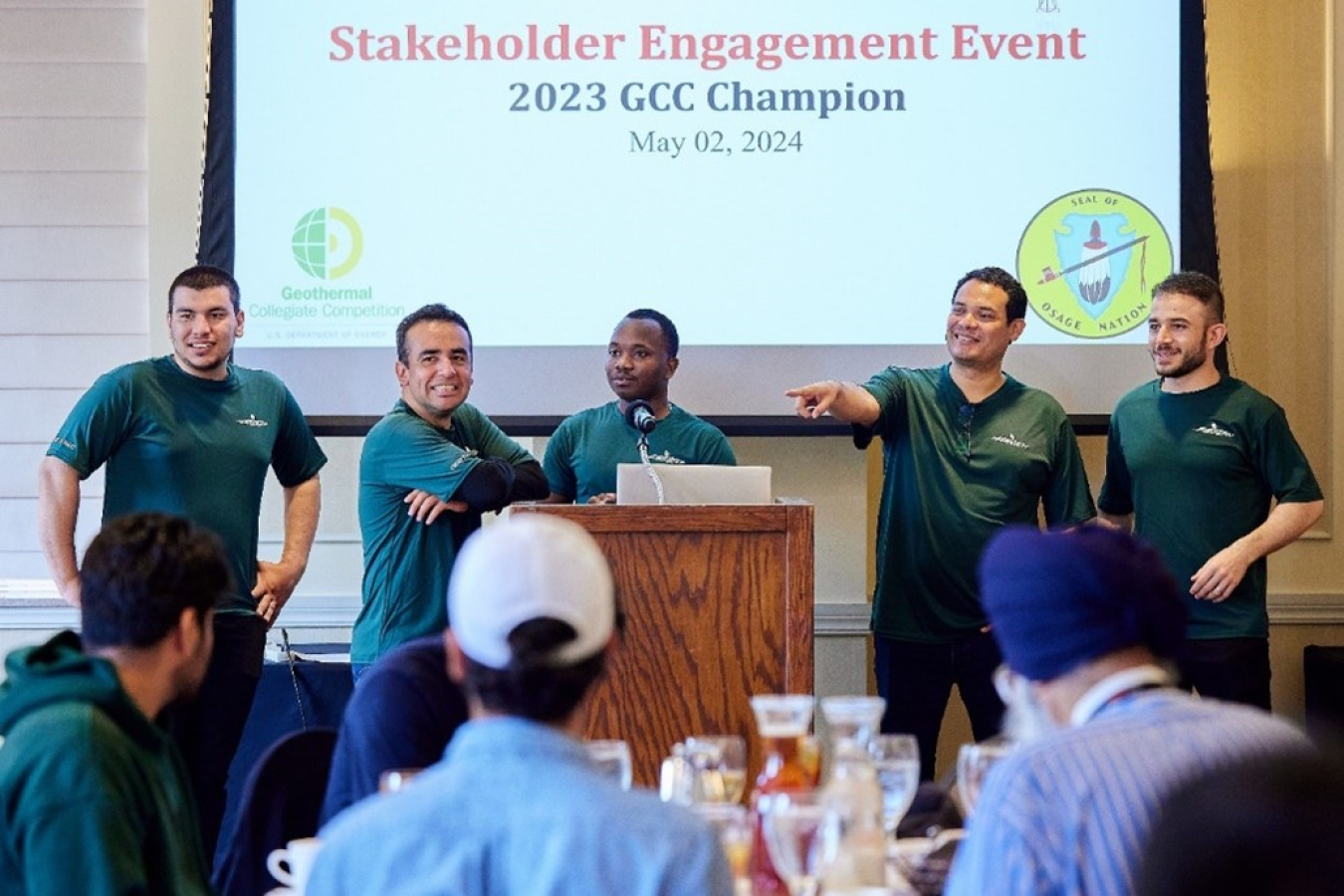What is the Geothermal Collegiate Competition?
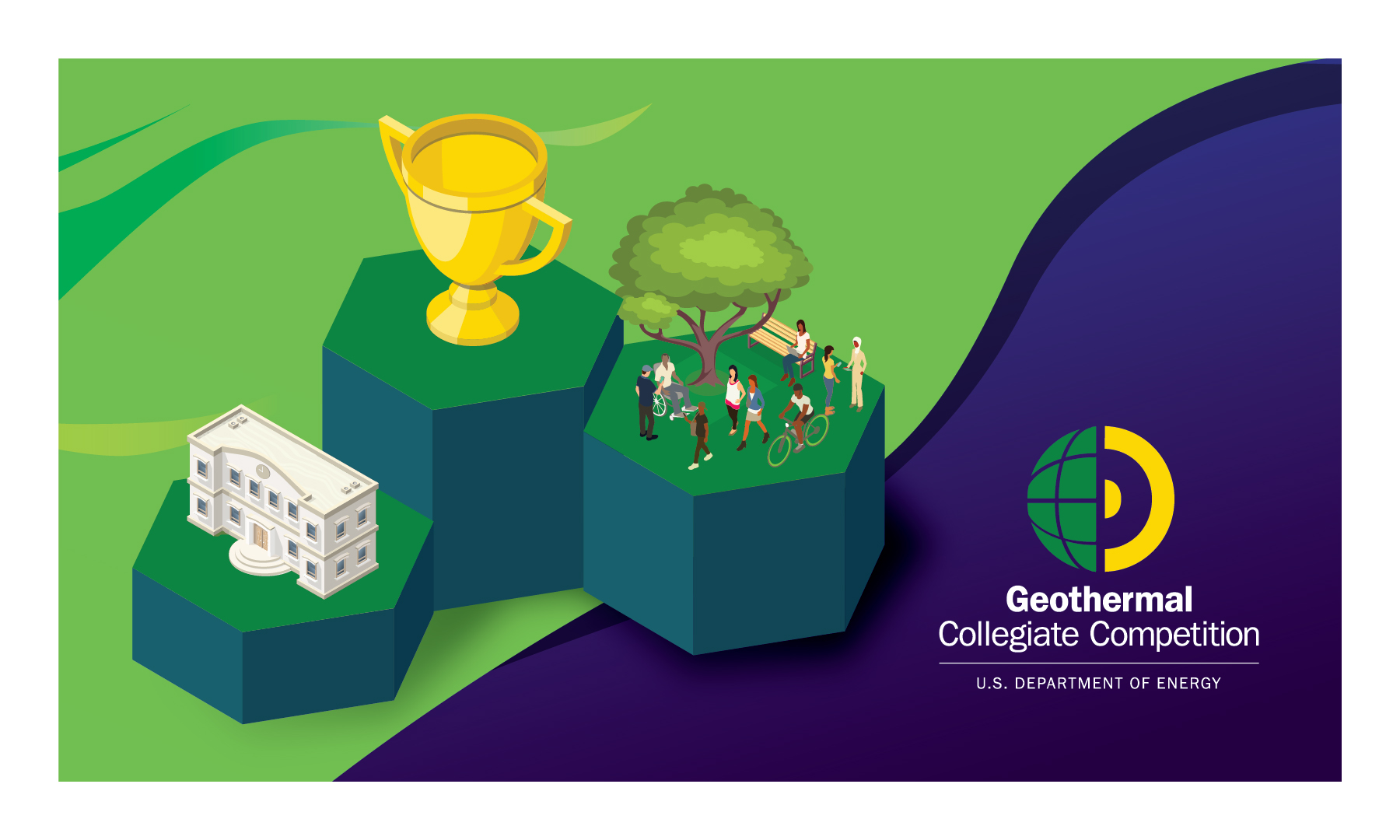
The U.S. Department of Energy’s (DOE) Geothermal Collegiate Competition (GCC) invites teams from collegiate institutions to develop real-world geothermal solutions while competing for cash prizes and gaining resume experience in the renewable energy industry. Students of all majors, minors, and career paths are encouraged to participate.
Competing in the GCC provides an introduction to the renewable energy field, opportunities to engage with industry professionals as well as local communities, and a deeper understanding of how geothermal energy can provide efficient, reliable energy solutions to communities.
The GCC is now a part of DOE’s American-Made collection of prizes and competitions. The Office of Geothermal (OG) has funded the GCC for more than 10 years, supporting workforce development and giving students a chance to gain resume experience in the geothermal industry while still in school.
Subscribe to receive updates about the Geothermal Collegiate Competition. Interested in geothermal news beyond the Geothermal Collegiate Competition? Subscribe to OG's email updates.
Past Competitions
Thirty-three teams from 25 U.S. collegiate institutions applied to compete in the Fall 2024 GCC, which featured two tracks: a Technical Track, where students performed a resource assessment and designed a geothermal heating and cooling system for a community of their choosing, and a Policy Track, where students presented a high-level idea for a geothermal heating and cooling system in a community or campus based on analysis of the regulatory environment, economic assessment, and/or workforce.
Winning teams proposed projects ranging from repurposing inactive oil and gas wells for geothermal heating and cooling to using geothermal district heating and cooling to support college campus buildings and an expansion, to leveraging geothermal to reduce energy costs for manufactured home community and a multifamily building.
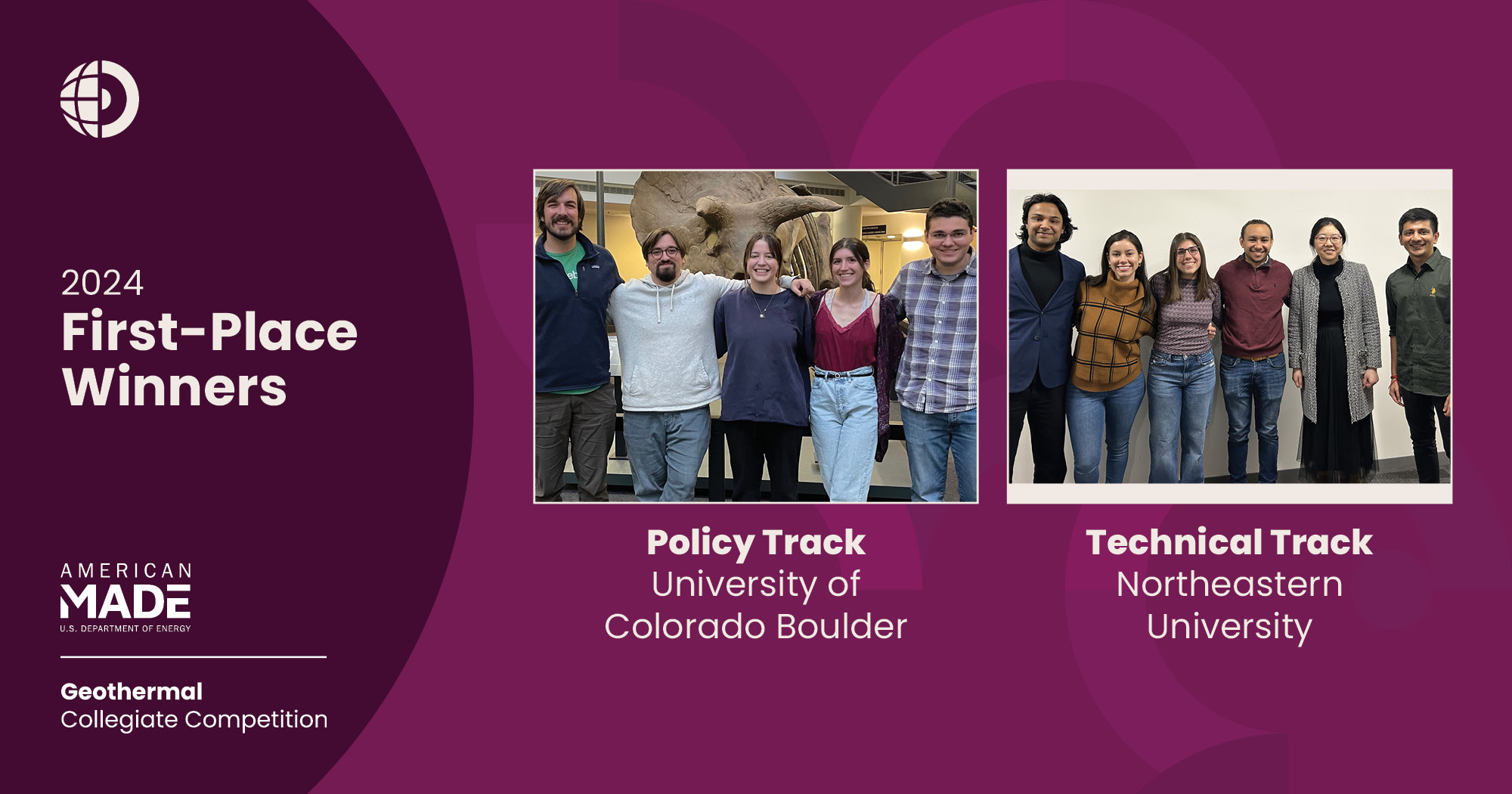
First-Place Teams
Technical Track: Northeastern University
The “Husky Heat Harvesters” team from Northeastern University are paving the way for future micro-districts across the greater Boston, MA, area. Their project proposed a plan to integrate smaller geothermal district heating and cooling systems on campus to improve the current outdated infrastructure. Based on their design, the project would meet all heating and cooling needs for three energy-heavy academic buildings.
Policy Track: University of Colorado Boulder
University of Colorado Boulder’s team explored the feasibility of retrofitting a multifamily building in Louisville, KY, with a geothermal heat pump. The team determined the project could help stabilize energy use, make the campus energy system more resilient, and create jobs and educational opportunities.
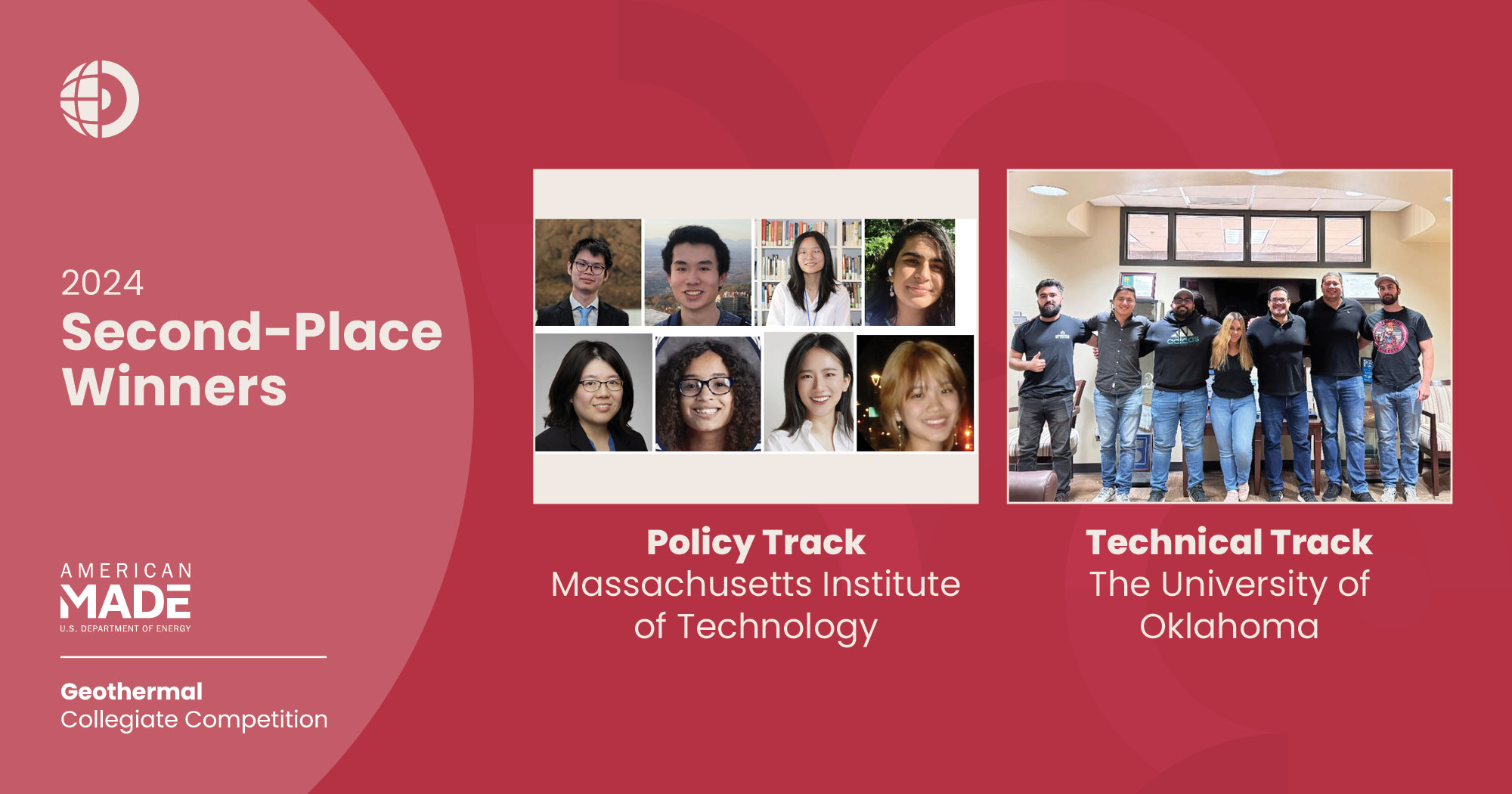
Second-Place Teams
Technical Track: The University of Oklahoma
The team at The University of Oklahoma looked at repurposing four inactive oil and gas wells to heat and cool a small district, including a greenhouse, wellness center, community event center, and children’s learning center. Based on their assessment, the project could reduce energy costs, allowing funds to be reallocated toward food, education, and wellness programs.
Policy Track: Massachusetts Institute of Technology (MIT)
MIT’s project explored implementing a geothermal district heating and cooling system tailored to the needs of a six-building cluster. The project would provide critical data on energy use, cost savings, and scalability, and findings from MIT work could help inform campus-wide implementation.

Third-Place Teams
Technical Track: Colorado School of Mines
The team at Colorado School of Mines worked on a project for a community of 39 manufactured homes in Golden, CO. The community is seeking an energy solution that cuts costs and fits into new manufactured home designs with ease. The “Green Grid Generators” team developed a plan for a geothermal heating and cooling system that works in different home sizes, reduces energy costs, and helps the community become more energy independent.
Policy Track: Texas A&M University
The “Aggieland Visionaries” at Texas A&M University devised a project to repurpose two oil and gas wells on their adaptable RELLIS Campus. The project would provide a reliable geothermal heating and cooling system for the campus while giving students hands-on learning in geothermal energy and illustrating how oil and gas wells can be repurposed for geothermal use.
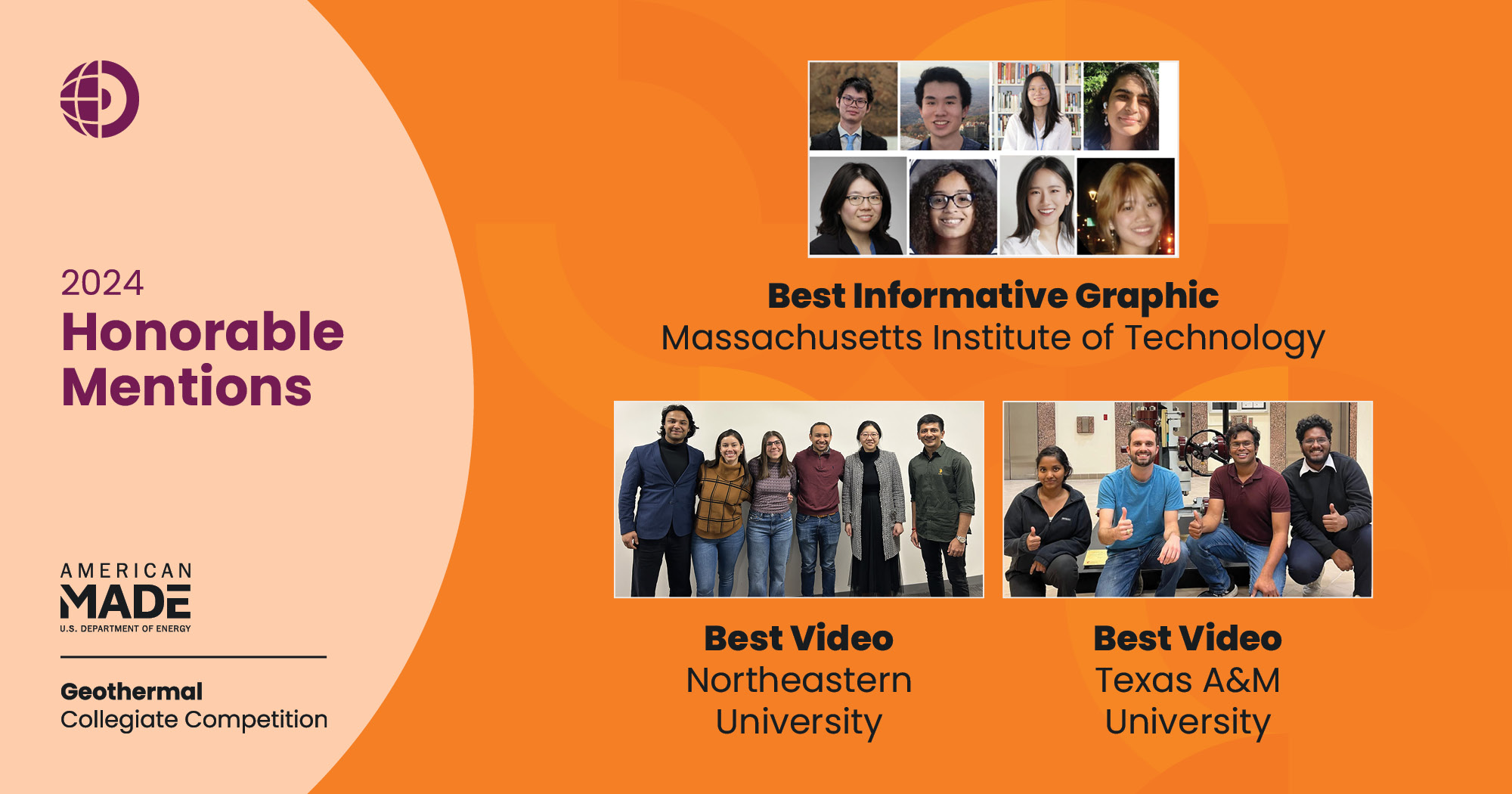
Graphic and Video Honorable Mentions
Honorable mention for best informative graphic: Geo@MIT Team (Massachusetts Institute of Technology)
Honorable mention for best video: Tie: Northeastern University and Texas A&M University
Thank You, 2024 GCC Mentors!
Thank you to the following geothermal industry professionals who volunteered to mentor teams throughout the Spring 2024 Geothermal Collegiate Competition:
- Aparna Aravelli, Florida International University
- Timothy Carr, West Virginia University
- Nagasree Garapati, University of New Haven
- Jackson Grimes, Project InnerSpace
- Sarah Harper, Fervo Energy
- Jonathan Hernandez, Brightcore Energy
- Saqib Javed, National Renewable Energy Laboratory
- Bryant Jones, Geothermal Rising
- Amelia Letvin, Geothermal Rising
- Kortney Lull, Midwest Geothermal
- Kent Marsh, Colorado Mesa University
- John McLennan, University of Utah
- Juliet Simpson, National Renewable Energy Laboratory
- Faith Smith, National Renewable Energy Laboratory
- Isabel Varela, HEET
- Matt Villante, Pacific Northwest National Laboratory
- Luca Xodo, STEAM
The 2023 competition featured two tracks: the Technical Track, in which teams designed a geothermal heating and cooling system from the ground up for a proposed community of their choosing; and the new Policy Track, in which teams conducted an analysis of the regulatory environment and economic feasibility for a proposed geothermal system. Thirty-three teams from 25 U.S. collegiate institutions applied to compete, and teams in either track had the option to be paired with a volunteer mentor, gaining valuable connections to learn more about the geothermal industry.
Learn more about the winning teams below, and read OG's success story on how GCC teams collaborate with communities on their projects: Geothermal Collegiate Competition Helps Communities Explore Energy.

First-Place Teams
First-place teams from both tracks earned $10,000 in prize funding for their innovative geothermal applications, as well as funding to host a geothermal stakeholder event in the community where their project took place.
Policy Track: Columbia University & Princeton University
The team from Columbia and Princeton Universities partnered with the Native Village of Elim to explore geothermal options for the 330-person Alaskan town. The team’s economic analysis of their proposed ocean-based closed-loop geothermal heating and cooling system found that system costs could be recouped in as little as 14 years, advancing energy in a manner consistent with the Inupiat way of living from the land and saving residents more than 2.3 million gallons of fuel oil and 70 million pounds of wood over 30 years.
Technical Track: The University of Oklahoma
The University of Oklahoma team designed a system of geothermal wells to heat and cool the Osage Nation’s 40,000-square-foot greenhouse, supporting efforts for native food sovereignty in Pawhuska, Oklahoma. The greenhouse was established during the COVID-19 pandemic when there was a breakdown in the Tribe’s food system. The proposed geothermal system design would help alleviate the challenge of maintaining a constant year-round growing temperature.
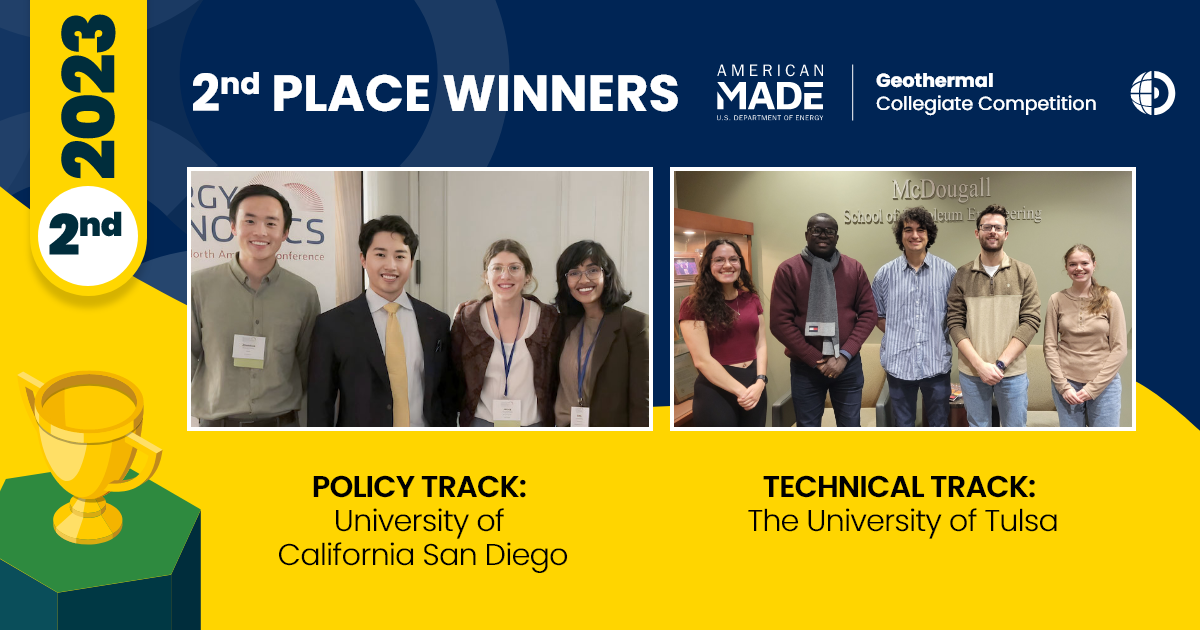
Second-Place Teams
Second place and $6,000 in prize money each went to:
Technical Track: Kyle White’s Team from the University of Tulsa
This team took second place for designing a system to bring geothermal to the Lorton Performance Center—a musical and performance arts hub that currently accounts for 6% of the university’s heating and cooling costs—by using horizontal piping installed under a nearby athletic field.
Policy Track: Davidson Lab’s Team from the University of California San Diego
This team proposed using federal incentives to revitalize the Boise Cascade Mill—a brownfields site in Cascade, Idaho—with a geothermal system that could meet an 8.6-GWh annual energy demand for over 2,800 residents while creating nearly 100 local jobs.
Thank You, 2023 GCC Mentors!
Thank you to the following geothermal industry professionals who volunteered to mentor teams throughout the Fall 2023 Geothermal Collegiate Competition:
- Aparna Aravelli
- Philip Ball
- Kelly Blake
- Timothy Carr
- Tawfik Elshehabi
- Nicholas Fry
- Nagasree Garapati
- Jackson Grimes
- Sarah Harper
- William Harvey
- Bryant Jones
- Sudeep Kanungo
- Aaron Levine
- Daniel Minguez
- Pajang Priyandoko
- Juliet Simpson
- Faith Smith
- Andrew Stumpf
- Luca Xodo
In the 2022 competition, student teams designed district use geothermal systems and geothermal curriculums for local schools, partnering with local communities through stakeholder events.
The Sooners Geothermal Team from the University of Oklahoma earned first place and $10,000 for designing a system to repurpose six abandoned oil and gas wells in Shawnee, Oklahoma, to provide geothermal energy for more than 730,449 square feet of educational and municipal buildings. The area includes sites within the Absentee Shawnee Tribe and Potawatomi Nation jurisdiction (learn more about the team's community event highlighting this work). The University of North Dakota and Reykjavik University earned second place and $5,000 for their design of a combined heat and power geothermal system for the city of New Town, North Dakota, located on the Fort Berthold Indian Reservation and home to the Mandan, Hidatsa, and Arikara (MHA) Nation, and the University of Colorado-Boulder took third place and $2,500 in prize funding for their design of a geothermal ground source heat pump for a local non-profit that provides a range of support to young people.
Spring 2021:Community Geothermal
How can direct-use geothermal benefit my community?OG reached out to the participants of the 2021 GCC to learn how the competition and their backgrounds in science, technology, engineering, and mathematics prepared them for a future in the energy workforce and influenced their career paths. Read the full interviews.
Fall 2020: Infographics
How can print and digital infographics and data visualization foster broader understanding of geothermal energy?Spring 2020: GIS Mapping
How can geospatial mapping increase our understanding of geothermal?2019: Data Visualization
Where do you target your next production well to maximize geothermal reservoir performance?Students transformed raw data from the Frontier Observatory for Research in Geothermal Energy (FORGE) site into compelling visualizations as part of this challenge.
2016: Infographic
What is the future of geothermal energy and how will it impact you?2014: GeoEnergy is Beautiful
2013: Development of a business white paper on geothermal energy production and commercialization in each team's state or region
2012: Assessment of geothermal resources at the Snake River Plain
2011: Assessment of geothermal resources at the Rio Grande Rift
Impacts
One of OG’s aims in running the GCC is to expand college students’ knowledge of and experience working in geothermal. Increasing the number of teams that register, the range of academic disciplines they bring to bear on geothermal projects, and the number of colleges and universities they represent is a key indicator that OG is sharing the career potential in the geothermal industry with a growing audience. In 2024, 33 teams from 26 U.S. collegiate institutions are competing: 22 teams for technical, 11 for policy; of these, 19 teams requested to be paired with a mentor. In 2023, reviewers noted that the submissions to the new policy track were remarkably high quality, especially for a first-time addition to the competition.
The GCC emphasizes the importance of collaborating with communities in developing and implementing geothermal projects. Winners host events to discuss their proposed designs and analysis with the communities featured in their competition projects.
Geothermal Vision, for instance, the second-place team from the College of Engineering and Mines at the University of North Dakota and Reykjavik University in the 2022 competition, partnered with the Mandan, Hidatsa, and Arikara Nation (MHA Nation) on completing the project and hosting a community engagement event. During the event Panelist Dr. Monica Mayer, a Tribal councilwoman for the MHA Nation, highlighted how the team modeled excellent Tribal engagement throughout their project and why such efforts are vital: “You come out to the community, you talk to the people, you tell them what your ideas are, you let them know how you are going to be respectful of culture, tradition, way of life, and help us keep our land, air, and water clean and not take advantage of us. That is called meaningful Tribal consultation.”
The oil and gas and geothermal industries share similar tools and processes for accessing energy in the subsurface, and some participants in the GCC have gained a new appreciation for how their skills and experience gained in other fields can be used in geothermal. José Aramendiz and César Vivas, two members of the winning team from the University of Oklahoma in the 2023 GCC’s technical track, spent several years working in oil and gas before pursuing their Ph.Ds. After participating in the 2023 competition, Vivas and Aramendiz shared how delighted they were not only to apply their skills to advancing geothermal technologies, but also to have gained new awareness of how geothermal energy can positively impact communities.
GCC In the News
ThinkGeoEnergy: Geothermal Competition Winners Visit Partner Community in Elim, Alaska
Global Renewable News: U.S. Department of Energy Announces Winners of 2023 Geothermal Collegiate Competition
CleanTechnica: U.S. Department of Energy Announces Winners of 2023 Geothermal Collegiate Competition
Grand Forks Herald: UND Engineering Students Tap into Western North Dakota’s Geothermal Potential


